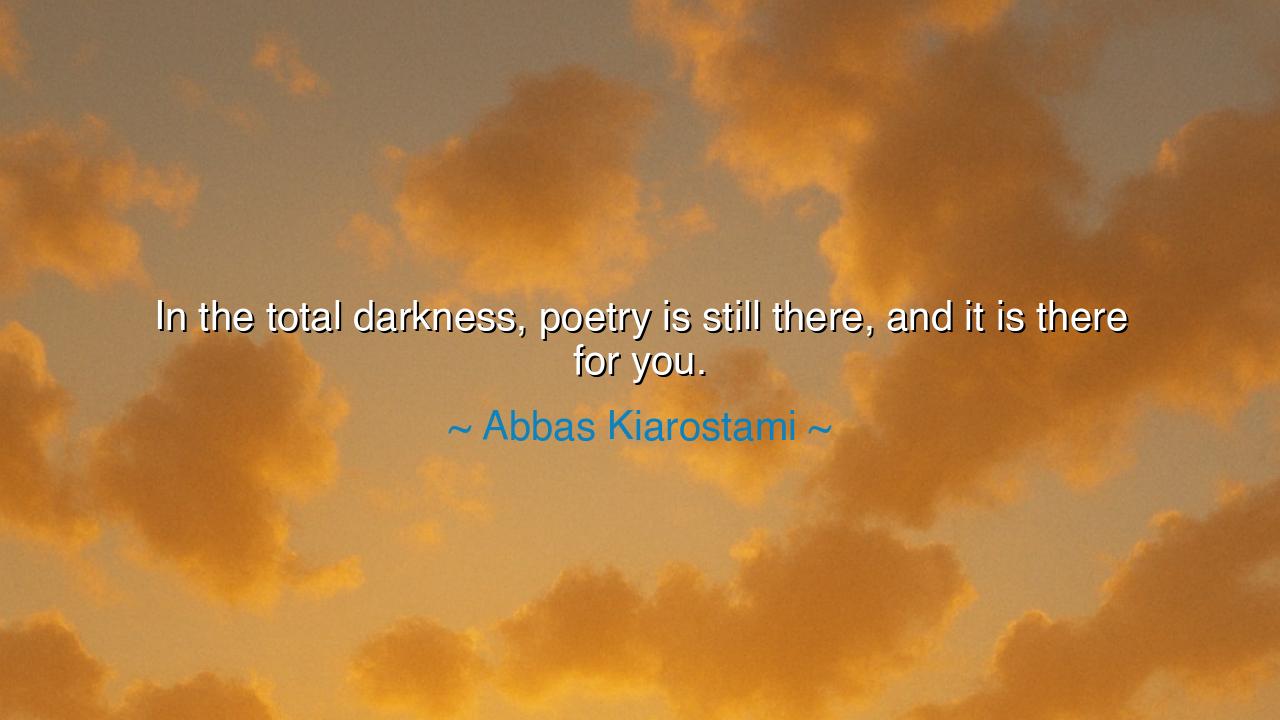
In the total darkness, poetry is still there, and it is there






In the luminous words of Abbas Kiarostami, “In the total darkness, poetry is still there, and it is there for you.” This saying is not merely about verse on a page, but about the eternal flame of beauty, meaning, and imagination that refuses to be extinguished, even when the world feels consumed by despair. Kiarostami, the Iranian filmmaker and poet, lived in a land of censorship, war, and uncertainty. Yet he reminds us that in the darkness—whether personal or political, whether inner or outer—there remains a light that can be found in poetry. It is not far away, not locked in ivory towers, but waiting for you, a companion in the night.
The origin of these words rests in Kiarostami’s devotion to art as a form of survival. He was not only a filmmaker but a master of imagery, who often turned to poetry—especially Persian classical poets like Rumi and Hafez—for inspiration. In Iran’s darkest times, when voices were silenced and freedoms strangled, poetry endured. It became a hidden lantern, glowing in hearts, reminding people that truth and beauty could not be erased. Thus, Kiarostami’s declaration is






TLPhuong Thao Le
This quote feels like a comforting invitation to find meaning and beauty, no matter the circumstances. But it also raises an important question: if poetry exists in the dark, how do we find it? Is it simply about being open to it, or does it require an active search? I’m curious to know whether poetry can only be appreciated after emerging from the darkness, or if it can be recognized while you’re still in the midst of it.
TMNguyen Ha Tra My
I find it powerful that poetry is framed as something that exists even in total darkness. I’d be curious to know what Kiarostami meant by ‘darkness’—is it a metaphor for personal struggle, societal issues, or something else? It feels like the quote carries a lot of weight in its ambiguity. Does poetry, or art in general, hold a universal truth that is accessible to everyone, or is it only meaningful for those in the right mindset to receive it?
ALQuynh Anh Le
Kiarostami’s words remind me of how often we overlook the small, beautiful things in life when we’re in darkness—emotionally, mentally, or even physically. It makes me think: What does ‘poetry’ mean in this context? Is it literal poetry, or is it about any form of expression that offers solace? In times of despair, can poetry provide a kind of light or guidance that we might not realize we need until we reflect on it?
HCHoang ha chi
I find this quote deeply reassuring. The notion that poetry is ever-present, even in the dark, speaks to the resilience of art. It makes me wonder about the role of creativity in challenging times. Is poetry more profound when written from darkness? Does it capture something about the human experience that we can’t express otherwise? I feel like this quote speaks to the power of art to heal and to help us make sense of tough situations.
KDkhanh dao
This quote is quite comforting in its simplicity. The idea that poetry exists even in darkness suggests that art and beauty can be found in the most difficult of times. I wonder, though, how many people really see poetry in those moments? Is it always easy to recognize, or does it require a shift in perspective? Maybe, for some, it’s a reminder that even when things seem hopeless, there is still something worth connecting to.